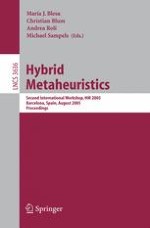2005 | Buch
Hybrid Metaheuristics
Second International Workshop, HM 2005, Barcelona, Spain, August 29-30, 2005. Proceedings
herausgegeben von: María J. Blesa, Christian Blum, Andrea Roli, Michael Sampels
Verlag: Springer Berlin Heidelberg
Buchreihe : Lecture Notes in Computer Science
